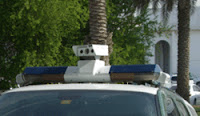 |
[Photo from Wikipedia] |
Look, I am not a conspiracy theorist! And I don't go looking for violations of our freedom and privacy rights under every rock. I am simply an Augusta, Georgia criminal lawyer, and former federal prosecutor, who enjoys practicing law with my son and blogging about criminal law.
But, in my opinion, every freedom loving citizen should be concerned about how new technology is affecting our freedom and privacy rights. In some ways, we are already past George Orwell's 1984. We have discussed in this blog a number of the ways in which the government is already tracking our every move. But have you heard about the latest method of collecting data about your movements?
It is called the Automatic License Plate Recognition device, (or "ALPR"). In other countries around the world where this technology is already being used, it is commonly referred to as the Automatic Number Plate Recognition device, (or "ANPR," for short). Different names, but same scary device!
Simply put, here is how this new policing device, or ALPR, works: Police cars have mounted scanners which capture thousands of tag numbers and store the information in computer data bases, which can almost instantly tell the police if any of the motorists who passed by have any outstanding warrants, alerts, or traffic tickets. But data is stored about innocent motorists, too.
According to Wikipedia, these tracking devices, or ALPRs, have been around for several years and are already in common use in other nations around the world. Now, various police agencies in this country are also implementing their usage. For instance, various news reports indicate that, just this week, the Massachusetts Executive Office of Public Safety has approved grants totaling $500,000 for police departments to utilize ALPRs in that state.
Look, as I have said before, I am no bleeding heart! I am a former career prosecutor. In short, I am a strong advocate of law and order and police professionalism. I can also see the benefits of using ALPRs, for example, in conjunction with Amber Alerts. But part of me also worries about the growing threats to our privacy rights. I believe that, as free citizens in a free nation, all of us should always be concerned about "Big Brother" watching us and about the potential abuses of new technology.
For example, we should discuss ways to prevent the use of such technology to track and store the movements of innocent, law-abiding citizens. Also, as I observed in my last blog post, concerning police monitoring of citizens through coordination of public and private security cameras, we should also be concerned that such devices could be improperly used to track the movements of opposition political parties. Also, do we know whether such policing devices are really all that accurate?
In short, in my opinion, there should be a public discussion about such technology, careful balancing of competing interests, and clear policies implemented, before such policing devices are implemented. But I don't see it happening! And I don't like the idea of Big Brother knowing where I choose to shop, or vacation, or what movies I choose to see! What do you think?





I live in Maryland, where the state government seems to be very enthusiastic about using ALPR technology. However, I've seen no public debate about ALPR use or privacy issues.
ReplyDeleteRecently I've become interested in figuring out how to spot stationary ALPR cameras. I drive with a radar detector, and in the past couple of years I've been getting K-band radar hits every time I pass by certain spots on major highways. I believe highway ALPR installations need radar to trigger an infrared flash to get clear shots of license plates on high-speed vehicles at night, and I plan to build a homebrew infrared detector to see if I can spot the flash.
I've also noticed many major intersections around the Baltimore area have what appear to be ALPR video cameras mounted on the traffic light supports and aimed at oncoming traffic. They're not red-light cameras -- those installations are pretty distinctive, they use a radar to detect vehicles running the light, and they're usually aimed to image the rear of the violating vehicle.
I realize ALPR has legitimate uses, but I think it's disturbing that the Maryland government has implemented what seems to be an extensive system mostly in secret.
I also think it's highly likely that ALPR data, once collected, will be retained indefinitely and could be used for purposes other than legitimate law enforcement.